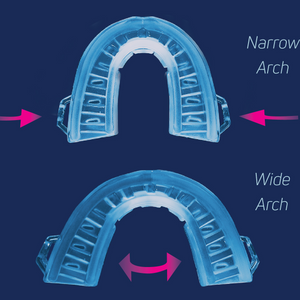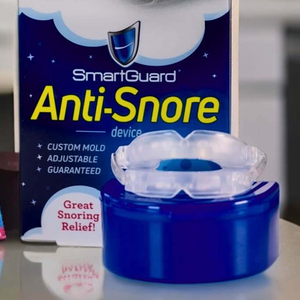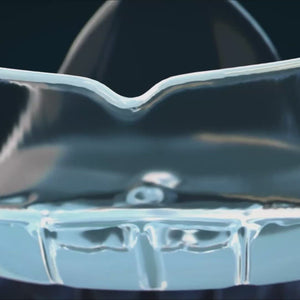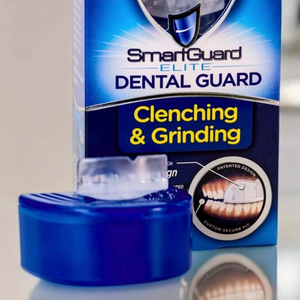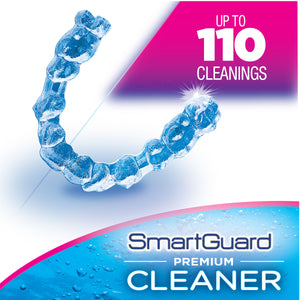Jun 19, 2025
ARE TEETH APPLIANCES CURE-ALLS?
While the mouth devices you get from a dentist, at pharmacies, or online can be effective in resolving issues caused by clenching teeth or snoring for millions of people, they can occasionally be disruptive and cause other issues. Moreover, teeth retainers are essential for maintaining alignment after orthodontic braces are removed; but they, too, can bring some side effects. Keep in mind that the benefits of trying them far out-weigh the risks. Let’s start with a few problems of retainers:
SIDE EFFECTS OF RETAINERS
Discomfort & Soreness: When first wearing a retainer, mild discomfort is normal as your mouth adjusts.
Gum Irritation: Ill-fitting retainers can cause redness, swelling, or tenderness in the gums.
Bad Breath & Bacteria: Retainers can trap bacteria and food particles, leading to
unpleasant odors.
Tooth Decay Risks: Without proper cleaning, retainers can harbor bacteria that contribute .to plaque buildup and cavities.
Allergic Reactions: Some individuals may be sensitive to materials like plastic or nickel used in retainers.
Tightness & Pain: If a retainer feels too tight or painful for an extended period, it may indicate shifting teeth or improper fit.
Regular cleaning and dental check-ups can help minimize these issues. If you experience persistent discomfort, it's best to consult your orthodontist.
WHAT ABOUT BRUXISM PREVENTERS?
Bruxism is the term for clenching and grinding one’s teeth at night or even during the day. This activity can cause dysfunctional jaw joints (TMJ syndrome) such as clicking and popping, headaches, the wearing down of teeth surfaces, difficulty chewing, and upper neck issues. There are some good bruxism preventers, such as mouth guards and splints to protect teeth from grinding, but they can have side effects:
Jaw Discomfort: Some people experience soreness or tightness in the jaw when adjusting to a new mouth guard.
Increased Salivation: Wearing a device in your mouth can trigger excess saliva production.
Dry Mouth: In some cases, mouth guards can lead to dryness, especially if they affect airflow.
Gum Irritation: Poorly fitted guards may cause redness or discomfort in the gums.
Changes in Bite: Long-term use of certain devices may slightly alter how your teeth align.
Difficulty Sleeping: Some people find it hard to sleep with a foreign object in their mouth.
If you experience persistent discomfort, it’s best to consult a dentist to ensure your bruxism preventer is properly fitted and suited to your needs.
WHAT ARE SOME ALTERNATIVES TO DENTAL GUARDS?
If traditional bruxism preventers like mouth guards aren't working for you, there are several alternatives to consider:
Stress Management: Since stress is a major cause of teeth grinding, techniques like meditation, yoga, and deep breathing can help reduce tension.
Behavioral Therapy: Cognitive Behavioral Therapy (CBT) can help identify triggers and develop coping strategies to minimize grinding.
Jaw Exercises & Physical Therapy: Gentle stretching and strengthening exercises can relieve jaw tension and improve function.
Dental Treatments: Orthodontic corrections or restorations like crowns can help align teeth properly and reduce grinding.
Lifestyle Adjustments: Reducing caffeine and alcohol intake, maintaining a calming nighttime routine, and improving sleep hygiene can all help minimize bruxism.
Botox Treatments: Botox injections can relax jaw muscles and prevent excessive clenching.
Biofeedback Therapy: Devices that monitor jaw activity and provide alerts when grinding occurs can help train your body to stop.
CAN WEARING BRACES CAUSE PROBLEMS?
Wearing braces can lead to some side effects, but most are manageable with proper care. Here are some common ones:
Discomfort & Pain: Braces apply pressure to teeth, which can cause soreness, especially after adjustments.
Gum Irritation & Bleeding: The brackets and wires may irritate the gums and inner cheeks, sometimes leading to minor bleeding.
Difficulty Eating & Speaking: Braces can make chewing harder, and some people experience temporary speech difficulties.
Tooth Decay & Plaque Buildup: Braces make cleaning teeth more challenging, increasing the risk of cavities and gum disease.
.
Jaw Pain: Some people experience jaw stiffness or discomfort, especially after tightening.
Root Resorption: In rare cases, braces can cause the roots of teeth to shorten, which may affect long-term stability.
Ulcers & Cuts: The metal components can cause small cuts or ulcers inside the mouth.
Regular dental check-ups and good oral hygiene can help minimize these effects. If you experience persistent discomfort, consulting your orthodontist is the best course of action.
OVER-THE-COUNTER ANTI-SNORE DEVICES
Anti-snore devices can be effective and life-changing, but they may come with some side effects depending on the type used. Here are a few common ones:
Jaw Discomfort: Some oral appliances, like mandibular advancement devices (MADs), can cause soreness or stiffness in the jaw.
Dry Mouth or Excess Salivation: Wearing a device in the mouth can lead to either dryness or excessive drooling, especially during the adjustment period.
Tooth & Gum Irritation: Some users experience mild discomfort in their teeth or gums due to the pressure applied by the device.
Nasal Irritation: Nasal-based anti-snore devices, such as nasal dilators or strips, can cause dryness, sinus irritation, or even nosebleeds.
Changes in Bite Alignment: Long-term use of certain oral appliances may slightly alter how your teeth align.
Difficulty Sleeping: Some people find it hard to sleep with a foreign object in their mouth, leading to disrupted sleep patterns.

